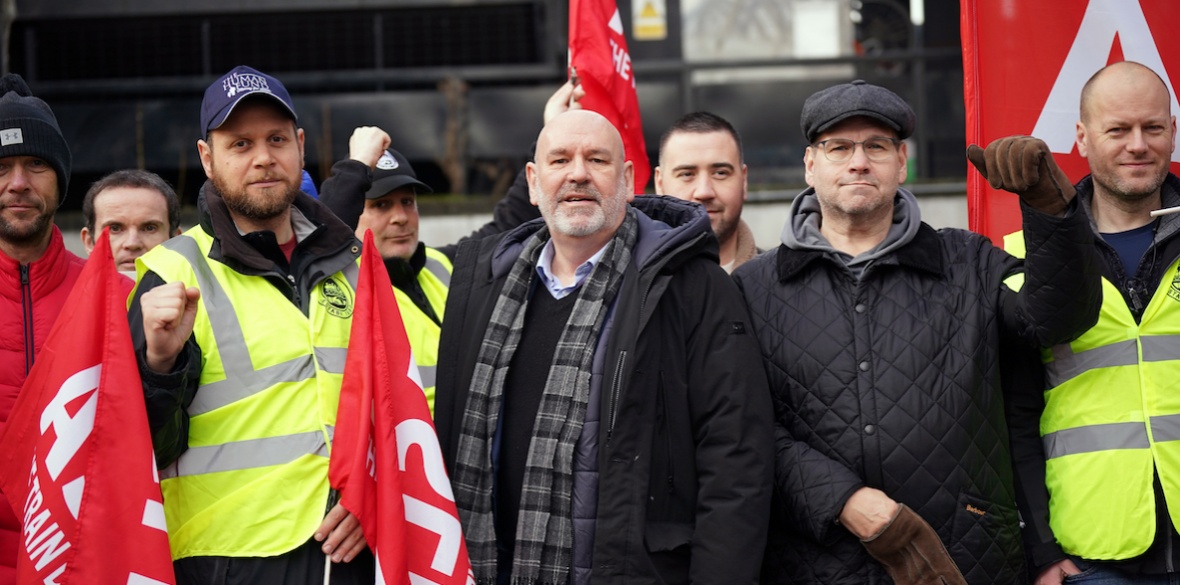This is the last article you can read this month
You can read more article this month
You can read more articles this month
Sorry your limit is up for this month
Reset on:
Please help support the Morning Star by subscribing here
NATIONAL rail strikes over pay, jobs and working conditions could go on for years, train drivers’ union Aslef warned today as its members returned to picket lines.
General secretary Mick Whelan stressed that his members have not had a wage rise since 2019, adding: “What option do we have — do we wait five, six, seven years?”
The union leader addressed reporters at London Euston station as Aslef followed up a 24-hour walkout across 15 rail operators on Wednesday with another strike today.
The action, also joined by hundreds of members from fellow transport union RMT, left large parts of the country with no services, as Avanti West Coast, CrossCountry, Northern, Southern and other operators could not run any trains.
Mr Whelan apologised for his late arrival at the picket line, joking he was delayed by “bloody rail strikes.”
The industrial action came as some health unions postponed a massive NHS walkout of nurses, ambulance workers and physiotherapists in Wales early next week following a new pay offer from Labour First Minister Mark Drakeford’s administration.
The proposal reportedly adds to 2022-23’s average 4.75 per cent rise with an extra 3 per cent — backdated to April 2022 — of which 1.5 per cent is a permanent increase.
Unite confirmed its ambulance members are still due to down tools, and the Royal College of Midwives did not call off its planned walkouts, but the Royal College of Nurses (RCN), the Chartered Society of Physiotherapy and GMB said members would pause and consider the package.
RCN stressed strikes in England on Monday and Tuesday would still go ahead as the Tory government is now isolated in its “refusal to reconsider the impact of current NHS pay levels.”
The Scottish government has also moved to reopen wage talks for the current financial year, with SNP ministers now offering an average 7.5 per cent, but Westminster has only tabled discussions on a deal for 2023-24.
RCN general secretary Pat Cullen said: “If other governments can negotiate and find more money for this year, the Prime Minister can do the same.
“Rishi Sunak has no place left to hide. His unwillingness to help nursing is being exposed as a personal choice, not an economic necessity.”
GMB official Nathan Holman said progress was due to the Welsh government being “prepared to talk about pay — a lesson for those in charge on the other side of the Severn Bridge.”
Rail unions have repeatedly accused the “dead hand” of Downing Street of blocking a deal which could end national train strikes, as ministers continue to claim that inflation-matching public-sector wage awards are “unaffordable.”
Mr Whelan said his members “don’t want to go back to work until we get a resolution” but warned that negotiations with employer body the Rail Delivery Group have “gone backwards” since the dispute was launched last summer.
Body chairman Steve Montgomery echoed the bleak description, saying progress is “going backwards and the talks have not moved on as quickly as we’d like.”
He claimed that his latest offer, already rejected by Aslef, would see annual train driver salaries rise to £65,000 over the next two years.
But the union stressed that the proposals would add a “significant” number of contracted hours” for workers.
Bosses must “come with a different attitude” to talks planned for next week, Mr Whelan demanded.
RMT is still consulting its members over the deal, but general secretary Mick Lynch told the Morning Star earlier this week that the “extremely challenging offer is all self-funded and dependent on a series of cuts to services and terms and conditions.”








